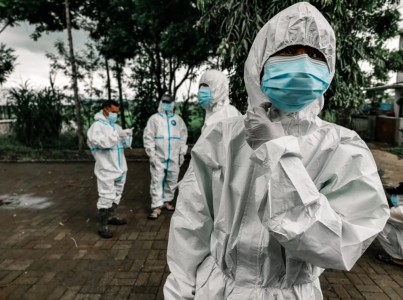Urgent health response: Lockdowns and vaccinations after disease outbreak
- Replies 0
Panic rarely begins with shouting but instead with whispers that slowly grow louder until no one can ignore them.
Fear spreads fast when it comes with headlines of lockdowns, sudden deaths, and urgent vaccines rushed into villages most people have never heard of.
What begins as a local crisis can quickly evolve into something the entire world watches anxiously, hoping it will not spill across borders.
This story is one of those moments where communities are forced to act quickly as the rest of the globe holds its breath.
A deadly Ebola outbreak in the Democratic Republic of the Congo has already claimed at least 16 lives, including four health workers, while infections have more than doubled in a single week.
The hardest-hit region is Kasai province, where towns have gone into lockdown and checkpoints have been set up to try to stop the virus from spreading further.
Emergency vaccination campaigns are underway, with officials scrambling to contain the outbreak before it spirals out of control.
A local official, Francois Mingambengele, warned bluntly: “It’s a crisis—and cases are multiplying.”
The World Health Organization confirmed that 400 doses of the Ervebo vaccine have already been deployed to Bulape, now considered a hotspot of the virus.
Another 45,000 doses are set to follow, part of a massive push to vaccinate vulnerable populations as quickly as possible.
The outbreak is being fueled by the Zaire ebolavirus, the deadliest strain of Ebola, which can kill up to 90% of patients if left untreated.
With memories of previous outbreaks that killed thousands still fresh, health experts are racing against time.
Also read: Salmonella outbreak prompts expanded frozen vegetable recall
This outbreak is believed to have started with a 34-year-old pregnant woman who checked into a hospital in late August with fever, severe bleeding, and bloody stool.
Despite treatment, she died within days from organ failure, and tests later confirmed Ebola as the cause.
Her tragic death marked the beginning of a chain of infections that has spread rapidly throughout Kasai and beyond.
The incident highlights how quickly the virus can appear, spread, and overwhelm fragile healthcare systems.
Doctors on the ground are using FDA-approved treatments like Ebanga and Inmazeb, which were developed after past Ebola epidemics in West Africa.
These therapies, combined with the vaccines, offer hope that this outbreak can be managed more effectively than earlier crises.
Still, the symptoms remain some of the most terrifying in medicine—vomiting, diarrhea, high fevers, and sudden bleeding from the eyes and gums.
Officials say shipments of life-saving drugs are being rushed into the region to avoid a catastrophe similar to the 2014-2016 outbreak that killed over 11,000 people.
Also read: A tragic milestone: Health officials confirm first fatal case in growing outbreak
This marks the 16th Ebola outbreak in the Congo and the seventh in Kasai province alone, raising questions about why the region remains so vulnerable.
Experts believe the virus jumps from animals like bats or primates to humans before spreading rapidly through contact with blood, sweat, vomit, or contaminated objects.
While officials urge people not to panic, the high mortality rate makes reassurance difficult, especially in communities where trust in health authorities is already fragile.
Global health leaders are urging vigilance as the world once again confronts the possibility of an epidemic expanding into something far worse.
Read next: Don’t wait, seniors—experts say now is the best time to get your shots

With vaccines being distributed and treatments deployed, do you believe these measures will be enough to contain the outbreak, or are we facing the early signs of another global health emergency? How prepared do you think your country would be if Ebola were to cross borders again? Share your thoughts in the comments below and join the discussion about how the world should respond when deadly diseases resurface.
Fear spreads fast when it comes with headlines of lockdowns, sudden deaths, and urgent vaccines rushed into villages most people have never heard of.
What begins as a local crisis can quickly evolve into something the entire world watches anxiously, hoping it will not spill across borders.
This story is one of those moments where communities are forced to act quickly as the rest of the globe holds its breath.
A deadly Ebola outbreak in the Democratic Republic of the Congo has already claimed at least 16 lives, including four health workers, while infections have more than doubled in a single week.
The hardest-hit region is Kasai province, where towns have gone into lockdown and checkpoints have been set up to try to stop the virus from spreading further.
Emergency vaccination campaigns are underway, with officials scrambling to contain the outbreak before it spirals out of control.
A local official, Francois Mingambengele, warned bluntly: “It’s a crisis—and cases are multiplying.”
The World Health Organization confirmed that 400 doses of the Ervebo vaccine have already been deployed to Bulape, now considered a hotspot of the virus.
Another 45,000 doses are set to follow, part of a massive push to vaccinate vulnerable populations as quickly as possible.
The outbreak is being fueled by the Zaire ebolavirus, the deadliest strain of Ebola, which can kill up to 90% of patients if left untreated.
With memories of previous outbreaks that killed thousands still fresh, health experts are racing against time.
Also read: Salmonella outbreak prompts expanded frozen vegetable recall
This outbreak is believed to have started with a 34-year-old pregnant woman who checked into a hospital in late August with fever, severe bleeding, and bloody stool.
Despite treatment, she died within days from organ failure, and tests later confirmed Ebola as the cause.
Her tragic death marked the beginning of a chain of infections that has spread rapidly throughout Kasai and beyond.
The incident highlights how quickly the virus can appear, spread, and overwhelm fragile healthcare systems.
Doctors on the ground are using FDA-approved treatments like Ebanga and Inmazeb, which were developed after past Ebola epidemics in West Africa.
These therapies, combined with the vaccines, offer hope that this outbreak can be managed more effectively than earlier crises.
Still, the symptoms remain some of the most terrifying in medicine—vomiting, diarrhea, high fevers, and sudden bleeding from the eyes and gums.
Officials say shipments of life-saving drugs are being rushed into the region to avoid a catastrophe similar to the 2014-2016 outbreak that killed over 11,000 people.
Also read: A tragic milestone: Health officials confirm first fatal case in growing outbreak
This marks the 16th Ebola outbreak in the Congo and the seventh in Kasai province alone, raising questions about why the region remains so vulnerable.
Experts believe the virus jumps from animals like bats or primates to humans before spreading rapidly through contact with blood, sweat, vomit, or contaminated objects.
While officials urge people not to panic, the high mortality rate makes reassurance difficult, especially in communities where trust in health authorities is already fragile.
Global health leaders are urging vigilance as the world once again confronts the possibility of an epidemic expanding into something far worse.
Read next: Don’t wait, seniors—experts say now is the best time to get your shots
Key Takeaways
- A fresh Ebola outbreak has erupted in the Democratic Republic of the Congo, killing at least 16 people and infecting dozens more within a week.
- The World Health Organization has already sent 400 vaccine doses to the hotspot of Bulape and promised another 45,000 as towns in Kasai province go into lockdown.
- Treatments like Ebanga and Inmazeb are being rushed to hospitals as symptoms of the deadly Zaire strain spread through communities.
- With this marking Congo’s 16th outbreak, health officials warn that rapid vaccinations and therapy distribution may be the only hope to prevent another global crisis.







